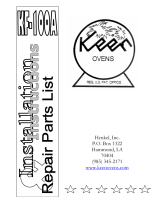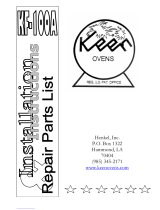
Henkel, Inc.
P.O. Box 1322
Hammond, LA
70404
(985) 345-2171
www.keenovens.com

Henkel, Inc.
P.O. Box 1322 * Hammond, Louisiana * 70404 * (985) 345-2171
www.keenovens.com
Model K-50 Portable Oven
Installation Instructions & Repair Parts List
One Year Limited Warranty
Henkel, Inc. warrants its products against defects in material and workmanship. Henkel, Inc. will either
repair or replace without charge any properly installed product which fails under normal operating
conditions within one year from date of installation, provided it is returned to our factory,
transportation prepaid, and our inspection determined it to be defective under the terms of this
warranty. The warranty covers only equipment manufactured by Henkel, Inc., and does not extend to
transportation, installation, or replacement charges at the buyers’ facility; nor does it apply to any other
equipment of another manufacturer used in conjunctions with Henkel, Inc. equipment. No other
warranty, expressed or implies exists beyond that included in this statement.
Recommended Spare Parts
When it is critical to have continuous operation of this unit;
we suggest having the following spare parts on hand:
Heating Element
Power Cord
Thermostat
General Information
The K-50 Keen oven is a portable unit designed for use in the shop or field. This oven will
protect electrodes from moisture during transfer from a holding oven to the job. It is light and easy to
carry. The square shape gives this oven greater stability vertically and horizontally. It is made of steel,
treated, then painted with a chemical-resistant blue paint. All Keen ovens are Mercury free.

Keen Ovens
Model K-50
Specifications
Electrode Capacity 50lbs. 18" rods
Volts (Specifiy) 120V or 240V AC/DC
Current Draw 1.25 amps
Watts 150W
Thermostat Factory Preset/Field Adjustable
Temperature Preset 275ºF : Range 100ºF-300ºF
Insulation 1"
Interior Dimensions 6" X 6 X 19" H
Net Weight 20lbs.
Shipping Weight 21lbs.
Shipping Dimensions 10.5" X 9" X 22.75"
Safety Precautions
Read all instructions completely before attempting to operate this unit.
*** SAVE THESE SAFETY INSTRUCTIONS ***
To reduce the risk of electrical shock, fire, or personal injury follow the guidelines below:
• Before connecting unit to a power source, be sure the voltage supplied is the same as that specified on the name plate
of the unit.
• Check outlet to ensure proper grounding of the electrical cable. Have a licensed electrician check the A/C power
outlet if you are not sure.
• Use this unit for its intended purpose as described by literature.
• Make sure power cord is located so that it will not be stepped on, tripped over, or otherwise subjected to stress of heat,
oil, or sharp edges. Do not close doors on the cord.
• To reduce the risk of damage to the electric plug and cord, disconnect by plug rather than by the cord.
• Do not use this unit if cord or plug is in poor condition. If it has been exposed to weather or immersed in water, have a
qualified serviceman inspect and replace parts as necessary.
• WARNING! NEVER HANDLE PLUG, CORD, OR UNIT WITH WET HANDS OR WHILE STANDING IN
WATER.
• Use special care when moving heavily loaded units.
• Do not store combustible material on or around the unit.

• Do not operate this unit empty.
• When using the unit at a distance where an extension cord becomes necessary, a 3-conductor grounding cord of
adequate size must be used for safety, and to prevent loss of power and overheating. Use only a UL listed extension
cord suitable for outdoor use. Make certain wire size is large enough for A/C amperage rating of unit.
Operation
To load oven, open latch on lid and simply place desired amount of electrodes in oven. The oven capacity is 50
lbs. of 18” electrodes.
To turn on the unit, simply plug the 8’ UL listed power cord into power source of appropriate voltage. Oven may
be operated on direct current
IF AMPLE VOLTAGE IS AVAILABLE. (Check name plate for voltage.) Unit will not heat
to capacity without appropriate voltage.
On 240V models, the plug is not supplied due to the many different receptical configurations in the field. When
attaching the plug to the power cord, be sure the plug is an approved component and is rated for the proper voltage and
amperage. All units meet electrical code requirements when used with a grounding plug and a grounded receptical.
Temperature Setting
The model K-50 oven is thermostatically controlled oven with a temperature range of 100º-300ºF. The thermostat
is factory preset at 275ºF, but it is field adjustable. To change thermostat setting, see “Corrective Maintenance” section.
Guide to Storage
See the enclosed guide to storage. This guide may be used in the absence of storage information from the
electrode manufacturer. In critical situations, contact your electrode manufacturer.
Functional Description
The K-50 oven is a portable oven that holds 50 lbs of 18” electrodes. The oven may be used to transfer welding
electrodes from a holding oven to a job site or continuously as a small holding oven.
Scheduled Maintenance
The manufacturer recommends that the unit be unloaded and cleaned of debris and dust every three months by
removing the plunger from center tube and turning unit upside down and tapping gently on bottom. It is recommended to
inspect the power supply cord for damage at this time. Replace cord if damaged.
Troubleshooting
The Keen oven model K-50 requires a minimal amount of electrical knowledge to repair if necessary.
IF OVEN FAILS TO OPERATE – NO HEAT
1.
Check power source.
2. Check power cord continuity. Replace cord assembly if faulty.
3. If power supply cord checks out, disconnect oven from power supply and remove bottom cover and insulation.

4. Remove the two leads from thermostat terminals and check for continuity across terminals. If continuity is not present
between thermostat terminals, replace thermostat. (See “Corrective Maintenance” section.)
5. If thermostat is good, check continuity of element. If continuity is not present, replace element.
IF OVEN OVERHEATS
1. If oven overheats, adjust thermostat. (See “Temperature Setting” section.)
2. If thermostat calibration fails to lower temperature, replace thermostat. (See “Corrective Maintenance” section.)
Corrective Maintenance
CHANGING ELEMENT
4. Disconnect wires on heating element.
1. Disconnect power source. 5. Remove old element and replace with new one
2. Remove two screws from bottom of oven. 6. Rewire as in diagram.
3. Remove bottom cover and insulation. 7. Replace insulation and oven bottom.
CHANGING THE THERMOSTAT
1. Disconnect from the power source.
2. Remove two screws from bottom of oven.
3. Remove bottom corner and insulation.
4. Disconnect wire terminals on thermostat.
5. Remove old thermostat and replace with new one.
6. Rewire as in diagram
7. Replace insulation and bottom, making sure wires are insulated from element.
Model K-50 Wiring Diagram

THERMOSTAT CALIBRATION & ADJUSTMENT
1. Follow instruction numbers 1, 2, and 3 from Changing the Thermostat.
2. Thermostat is readily visible in bottom of oven. Use small screwdriver and turn set screw. (Turning set screw
clockwise decreases temperature. Turning set screw counter-clockwise increases temperature. One-fourth [1/4] turn
equals approximately 35ºF.)
3. Replace insulation and bottom of oven.
Model K-50 Repair Parts List
ITEM # QUANTITY DESCRIPTION PART NUMBER
1 1 * Elements 120V 301019
240V 301020
2 1 Power Cord 301155
3 1 Handle 430103
4 1 Bottom Cover 100204
5 1 Thermostat
120V 301024
240V 301024
6 1 301085
7 1 Strain Relief 301043
8 1 Name Plate 450103
Neon Pilot Light

K-50 ACCESSORIES LIST
** Please state model number and serial number and specify voltage and wattage when ordering repair parts, spare parts,
or accessory parts. All necessary attaching hardware is supplied with each part ordered.
(Item numbers refer to
pictorial drawings below for
repair parts.)

HENKEL, INC.
Manufacturer of KEEN Ovens
Quality Since 1923.
Phone (985) 345-2171
Fax (985) 345-5653
PO Box 1322
Hammond, Louisiana
70401
Flux and Electrode Stabilizing Guide
After Exposure to Moisture a
Sufficient Time to affect Weld Quality
Type (AWS)
Air Conditioned
Storage
Before Opening
Dry Rod
Oven Holding
After Opening
Recondition
Step 1
Rebake
Step 2
180°F ± 25°
two hours
240°F ± 25°
one hour
Standard
EXX10
EXX11
EXX12
EXX13
EXX20
EXX30
80°F ± 20°
60% ± 10% RH
140°F ± 30°
Three hour total
180°F ± 25°
two hours
325°F ± 25°
one hour
Iron Powder
EXX14
EXX24
EXX27
90°F ± 20°
50% RH max
140°F ± 30°
Three hour total
180°F ± 25°
two hours
700°F ± 100°
one-half hour
Iron Powder-
Low Hydrogen
EXX18
EXX28
90°F ± 20°
50% RH max
400°F ± 50°
Two & one-half hour total
180°F ± 25°
two hours
600°F ± 100°
one-half hour
Low Hydrogen
EXX15
EXX16
90°F ± 20°
50% RH max
400°F ± 50°
Two & one-half hour total
180°F ± 25°
two hours
700°F ± 100°
one-half hour
Low-Hydrogen
High Tensile
EXXX15
EXXX16
90°F ± 20°
50% RH max
400°F ± 50°
Two & one-half hour total
180°F ± 25°
one hour
350°F ± 50°
one hour
Stainless
Inconel
Monel
Nickel
Brasses
Bronzes
Hard Surfacing
Special Alloys
90°F ± 20°
50% RH max
225°F ± 50°
Two hour total
Granulated or
Agglomerated
Flux
90°F ± 20°
50% RH max
240° F ± 50°
Not required
700°F ± 100° ∅
two hours
CONTACT YOUR ELECTRODE MANUFACTURER FOR SPECIFIC INFORMATION INVOLVING
CRITICAL OPERATIONS.
Electrode coating should not be exposed to the rebaking temperature without first having been reconditioned at a lower
temperature. Failure to observe this rule will result in breakdown of electrode coatings.
After rebake
,
lower tem
p
erature to holdin
g
level until reissue.
Note: In the HTS
Stainless electrode
groups, and 15 & 16
type coatings, there can
be a greater difference
in the maximum
temperature
requirements for
rebaking than those
shown. This can be
handled by special
request to the particular
manufacturer involved.
IMPORTANT:
This table is offered as a
guide to proper storage
and oven holding
temperatures for the
most common electrodes
in use today. In
addition,
recondition/rebake
procedures for electrode
coatings that have been
exposed to moisture for
a sufficient period of
time to affect the weld
quality are included.
Good judgment and the
manufacturer’s
recommendations should
be your guide.
/










